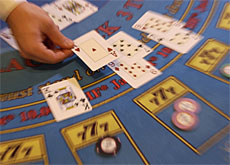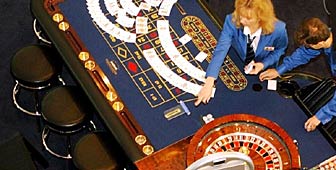Mountain resorts lose casino gamble

The decision to grant casino licences to resorts in the Swiss Alps has not paid off.
swissinfo discovered during a tour of mountain casinos that only one of the five – Crans Montana – appears to have been dealt the right cards.
A few players place their bets on a roulette table in Crans Montana’s casino.
A couple more try their luck at blackjack, and only a handful of the 120 slot machines are occupied.
But managing director Timothy Cullimore is not concerned. It is a slow Monday evening, a week before the start of the busy winter holiday period when the resort fills up.
Then, Cullimore says, the casino counts up to 1,000 visitors a night and even in the low season at least 150 people pass through its doors.
They are mostly locals who have made the short trip to Crans Montana from nearby towns in the valley below.
Key to success
“It’s important to realise that Crans Montana is both a tourist casino and a casino for the people of canton Valais,” Cullimore told swissinfo.
“We need both groups [tourists and local residents] to have a successful casino,” Cullimore said, explaining why Crans Montana was the only mountain resort to turn a profit in its first full year of operation.
This simple equation was apparently lost on the Swiss government when it granted casino licences to cities and towns in 2001.
Of the approximately 20 licences, six were given to mountain resorts in the belief that casinos would provide a boost for the stagnating economies in alpine regions.
High rollers
However, it would seem there are not enough big spenders among the wealthy tourists who come to resorts like Zermatt and St Moritz.
And the fact that they are isolated mountain villages works against these places as far as casinos are concerned, since, unlike Crans Montana, most are too distant from population centres.
During the low seasons, they can often resemble ghost towns, with disastrous consequences for their casinos.
The operations in Arosa and Zermatt have had to close and those in St Moritz and Davos are struggling financially, which does not bode well for the planned opening of a casino in Engelberg.
“If we have too much snow, people can’t reach us, like our Italian customers,” said Jean Claude Frings, director of the St Moritz casino, which is housed in the newly opened Kempinski Grand Hotel.
“If we don’t have enough snow, the skiers stay away. Eight months per year, we are looking at a market of 5,000 people, compared with a market of around a quarter of a million around Bern, for example.”
More restrictions
But Frings says mountain casinos were placed at a disadvantage from the start because they were granted “B” licences, which he says, make them less attractive.
“B casinos have lower maximum payouts and more restrictions than ‘A’ casinos [casino classification in larger towns and cities] but we have the same framework, so our costs are just as high but with 90 per cent less turnover or clientele,” he explained.
However, the government has granted B casinos special tax breaks.
Whereas A establishments have a 40 per cent tax rate, smaller B operations are expected to pay 30 per cent.
But even a government decision to lower the rate to 20 per cent for the money-losing B casinos has not helped, and the mountain regions are still waiting for their luck to turn.
swissinfo, Dale Bechtel in Crans Montana, Joanne Shields in St Moritz
Switzerland has 21 licensed casinos, the largest concentration of casinos in Europe.
Seven are grand casinos with “A” licences, which have no upper limit on bets.
Restrictions are placed on the number of slot machines and bets in the 14 “B” category casinos.
Swiss casinos had gross gaming revenues of SFr561 million in 2003, their first full year.
The Swiss Federal Act on Casinos came into force in 2000, seven years after Swiss voters approved a constitutional amendment to allow the operation of casinos.
The law was drawn up to ensure safe and transparent gambling, prevent criminal acts and minimise the negative social aspects of gambling.
The casinos provide an additional source of tax revenue, with the money subsidising the federal pension scheme and filling the coffers of the cantonal governments, as well as promoting tourism.

In compliance with the JTI standards
More: SWI swissinfo.ch certified by the Journalism Trust Initiative











You can find an overview of ongoing debates with our journalists here . Please join us!
If you want to start a conversation about a topic raised in this article or want to report factual errors, email us at english@swissinfo.ch.